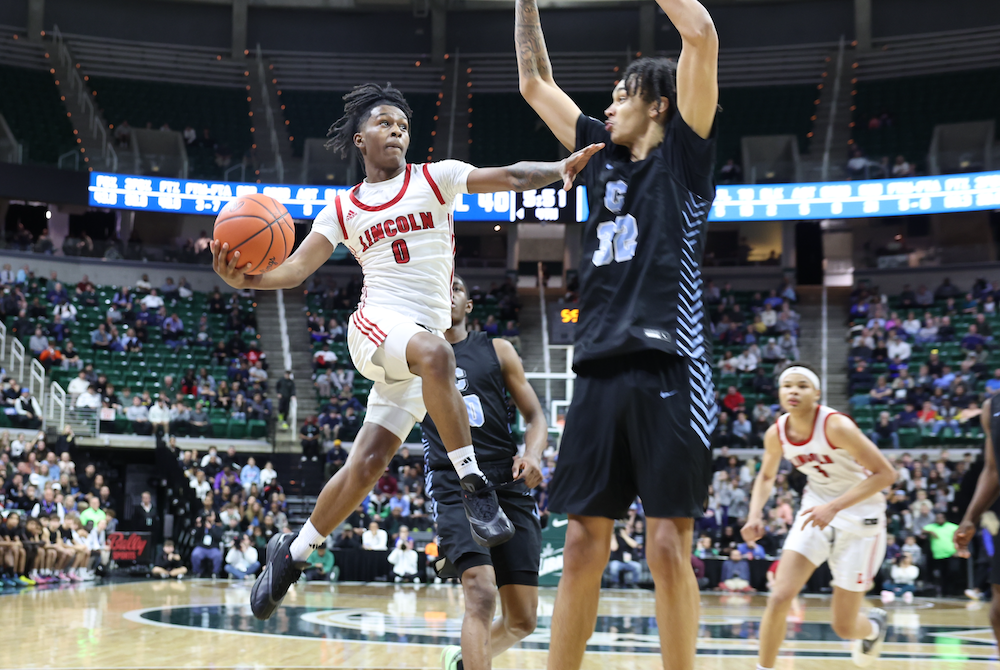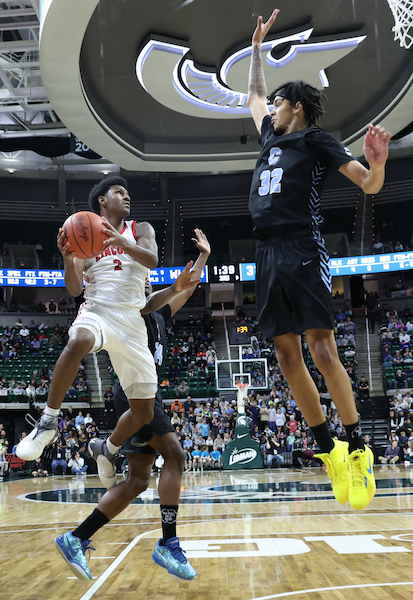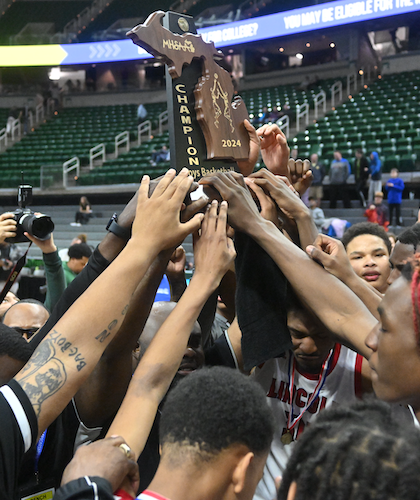
MHSA(Q&)A: Historian Ron Pesch
April 16, 2012
 When we receive a question on the history of MHSAA athletics that we can't answer on the spot, Muskegon's Ron Pesch is the first person we seek out for help.
When we receive a question on the history of MHSAA athletics that we can't answer on the spot, Muskegon's Ron Pesch is the first person we seek out for help.
Pesch took the reins as Michigan's chief high school sports historian during the mid 1990s after the retirement of legendary MHSAA record book originator Dick Kishpaugh and has contributed to various efforts and publications across the state.
One of his latest projects is the awarding of "retro" Mr. Basketball Awards. The first Hal Schram Mr. Basketball Award was given by the Basketball Coaches Association of Michigan in 1981 to Lansing Eastern's Sam Vincent. Three seasons ago, BCAM -- with research work by Pesch -- began awarding retro winners for the previous decades beginning with the 1920s. This winter, BCAM honored retro winners from 1922, 1932, 1942, 1952, 1962 and 1972.
Click to read more about those winners and the finalists recognized last month. Also, click for links to the previous retro winners. The retro Mr. Basketball project will last seven more seasons. Pesch explains more below.
How did you come up with rewarding a “Retro” Mr. Basketball?
The project came out of a conversation I had with (BCAM executive director) Tom Hursey at the basketball finals back in '99. Together, we hatched an approach honoring the state's past basketball greats. He let me run with it, while he worked on getting a subcommittee launched to make the selection.
How do you dig up all of this nomination info?
Between votes, I work on digging out the details. My initial target list always begins with all-state teams - if, of course they exist. All-tournament teams for the early years also serve as a starting point -- if they exist. Best I can tell, the Detroit Times, the Free Press and the News have all named all-state squads, at various points, back to about 1935. The Associated Press and UPI came to the game much later - somewhere around the early to mid 1960s. I then work on creating a crosstab on the players selected, noting the "teams" on which they were named (Class A 1st team, Dream Team, Class C 3rd team), and try to find quotes detailing their games. The result is really a reflection of the times and the history of newspaper reporting.
In early years, we can struggle to uncover a player’s first name, let alone his class in school. And statistical coverage of a player's abilities was very limited. It's simply the way things were back then. Everyone in town knew King Lewis, or Red Cherry, or Young Jacks. And the final box score only contained points, fouls, substitutions, as they were all you really needed to know about the game. But by visiting the state library in Lansing, and looking at a cross-section of newspapers, you can usually dig out what you need.
Do you collect from other sources as well?
Another source is high school yearbooks. Some resources have started to emerge online. I also tap into the MHSAA site and make contact with ADs around the state, asking for their assistance on digging out details - especially class in school. Like the current program, only "seniors" are considered for the award. Mid-year graduates can create a challenge, but the rule currently in place is a player is considered a nominee in the year in which he was last eligible for the state tournament. In other words, if you graduated in January or February of 1943, you would be considered for the 1942 ballot. It appears that a similar approach was used in selecting all-state teams.
|
Year |
Player |
High School |
Age |
Height |
Weight |
Year |
DFP |
DN |
DT |
AP |
UPI |
Tourney |
|
1971 A-1 G. |
Frank Tanana, Jr. (C) |
Detroit Catholic Central |
17 |
6-3 |
170 |
Sr. |
A1 |
A1 |
A1 |
A1 |
||
|
1971 A-1 C |
Tom McGill |
Flint Northern |
17 |
6-3 |
190 |
Sr. |
A1 |
DM |
A1 |
A1 |
||
|
1971 A-1 F. |
Lindsay Hairston |
Detroit Kettering |
17 |
6-9 |
203 |
Sr. |
A1 |
DM |
A1 |
A1 |
||
|
1971 A-1 F. |
Campy Russell |
Pontiac Central |
18 |
6-7 |
190 |
Sr. |
A1 |
DM |
A1 |
A1 |
That cross-tab table will help establish a list of nominees. A consensus first-team pick is an obvious candidate. When only a single all-state team is available, I'll do what I can to look up all-conference teams or all-area teams from around the state to see who else might be considered. While life after high school is not a considered when trying to pick a winner, a player who emerges as a star in college or in the pros may emerge as a candidate when you see his details in a local paper.
Bios are assembled from the newspaper reports, detailing as much as we can find on high school player's career. I'll tap into a variety of resources including old team histories when available. When needed, I'll toss out request to reporters, old and new, around the state. Local librarians and historians are another wonderful resource.
How does voting work?
Between sessions of the Boys Finals, the committee assembles to hash out a final ballot, and to make a selection. I don't vote, but I may guide the conversation and provide any additional details when needed, reminding members that we're focusing on their high school careers. The process is certainly imperfect. But the committee approach prevents the process from becoming a popularity contest. These guys have the benefit of watching many of the players play. And, like the current Mr. Basketball program, they sometimes surprise. But that's what makes it fun. And, of course, stirs the pot. It gets people talking about the history of basketball in this state.
Is there a theme to MHSAA basketball that has remained constant over the years?
For me the greatest thing about the basketball tournament is that it assembles a wide range of folks who want to see players they've heard about in action. And the process, for the most part, hasn't change since the 1920s. While the style of the game has changed, winning a title is much the same as it was back when our great-grandfathers played: You gotta get through the tournament. And only four trophies are awarded.
These guys were the "Magic" of their day. I'm hoping we never forget that.

Warren Lincoln Closes Boys Basketball Season with All-Time Accomplishment
By
Steve Vedder
Special for MHSAA.com
March 16, 2024
EAST LANSING – You can't say Warren Lincoln is wary of rematches. Not even when the opponent is ranked No. 1 in the state for most of the season.
The Abes proved winning a midseason meeting was no fluke by outlasting top-ranked Grand Rapids Christian 53-39 in Saturday's Division 2 Final at the Breslin Center.
Lincoln had defeated the Eagles 49-47 in Grand Rapids on Jan. 20, but Abes players say that win had limited influence on the outcome of the championship game two months later – and that they had no problem facing Grand Rapids Christian a second time.
"Honestly, I thought it would be different," junior guard Da'Marion Bozeman said. "We beat them the first time, so we knew they'd be ready. But we wanted to win so bad, so there was that motivation."
 The Abes used a 10-1 run in the fourth quarter to pull away for their first Finals title.
The Abes used a 10-1 run in the fourth quarter to pull away for their first Finals title.
The Eagles (26-3) were within 34-33 during the waning seconds of the third quarter, but Lincoln junior guard Markus Blackwell went to work. He hit a pair of 3-pointers, a layup and two free throws over a four-minute stretch to up his team’s lead to 47-39 with three minutes to go.
Blackwell has his own theory on playing Grand Rapids Christian a second time. If the teams' first meeting showed anything, it's that Warren Lincoln (24-4) – which then won 13 of 15 games after downing the Eagles the first time – had to play well inside.
"We knew what they can do and that was stopping their big man, but what we do best is play defense," he said.
"I was locked in offensively because you have to score to win. My teammates put me in a position to score, I just had to make the shots."
Blackwell finished with 24 points, including hitting 4-of-5 3-point attempts. Moses Blackwell added 12 points.
Jaylan Ouwinga had 16 points, six rebounds, three blocks and three steals for Grand Rapids Christian. Malachi Hooser had 14 points for the Eagles.
Grand Rapids Christian shot just 34.9 percent (15 of 43) from the floor this time, missing 13 of 15 3-point tries. Warren Lincoln also held a 53-39 rebounding edge.
 "We knew they had the one-two punch with the (Blackwell) brothers, and they have others who can shoot," Eagles coach Eric Taylor said. "We cut the lead and had to weather the storm. I thought at the end of the third quarter and going into the fourth we were in good position. They went to a zone, and we went a little stagnant."
"We knew they had the one-two punch with the (Blackwell) brothers, and they have others who can shoot," Eagles coach Eric Taylor said. "We cut the lead and had to weather the storm. I thought at the end of the third quarter and going into the fourth we were in good position. They went to a zone, and we went a little stagnant."
Lincoln coach Wydell Henry said going to a zone was risky but paid off.
"We don't typically go to zone, we want to press teams,” he said. “We want to turn you over and speed up the game."
The championship game appareance was Lincoln's first. The Eagles were playing in their first Final since 2017.
"They're a big team. We knew that," Henry said. "We beat them in Grand Rapids, which was big. We weren't scared. We just told the kids to stick it out."
PHOTOS (Top) Warren Lincoln’s Moses Blackwell (0) soars into the lane as Grand Rapids Christian’s Jaylan Ouwinga (32) attempts to block his path Saturday night at Breslin Center. (Middle) Ouwinga gets a hand up as Lincoln’s Markus Blackwell looks for an opening. (Below) Abes players raise their championship trophy. (Photos by Hockey Weekly Action Photos.)

